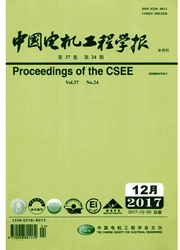

 中文摘要:
中文摘要:
采用时间序列中的自回归求和移动平均算法(ARIMA)对日负荷进行粗预测,获得消除了周期性的受气象因素影响较强的差值序列。结合气象信息,为小规模神经网络构造能反映气象,变化的新息序列,为网络提供良好的训练与适应环境,训出对气象非平稳,叟化敏感的输出因子Y,再用敏感因了对ARIMA算法的预测结果进行修正,从而构建出对气象适应性较强的ARIMA+Y的预测算法。利用Delphi5.0实现的负荷预测软件对广西负荷区进行预测,多年的运行证明:该算法对广西负荷区气象非平稳变化具有很好的敏感性和适应性,能显著提高气象非平稳变化日的预测准确率,较好地解决了在气象变化影响下用ARIMA算法预测准确率偏低的问题。
 英文摘要:
英文摘要:
The load forecasting accuracy is lower with ARIMA algorithm when weather change is unstable. Modeling methods of sparse coefficient ARIMA and sensitive BPNN to weather change are expounded in this paper. The ARLMA algorithm is used to forecast load and generate the sensitive error sequence that periodicity was removed to weather change, and this error and weather information are used to create innovation sequence and build training sample sets for small-scale BPNN and supply nicer training and acclimation for BPNN, obtaining sensitive output factor to unstable weather change in Guangxi load area. The forecasting software has been achieved and applied in Guangxi many years. The results show that the ARLMA algorithm with this adjustment factor can availably improve the forecasting precision, which precedes national standard.
 同期刊论文项目
同期刊论文项目
 同项目期刊论文
同项目期刊论文
 期刊信息
期刊信息
